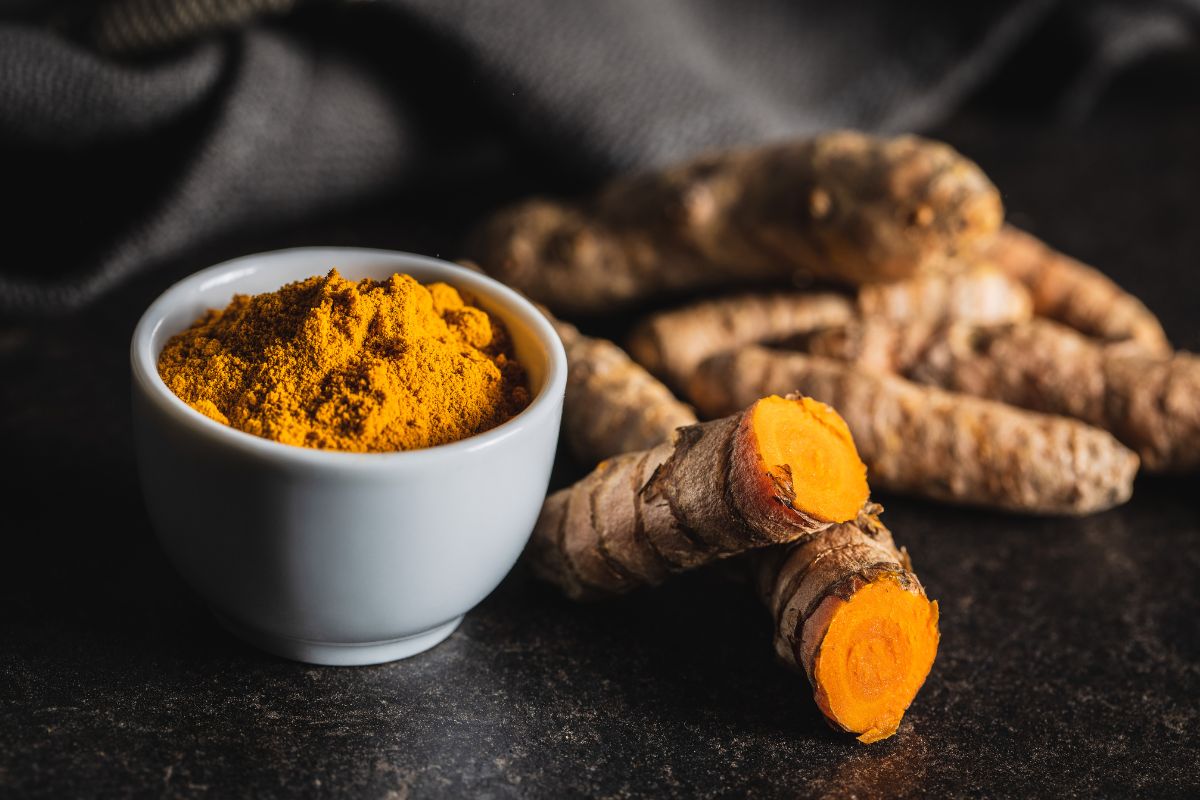Gout is a common type of inflammatory arthritis that can be extremely painful.
If you’re interested to learn more about the benefits of turmeric for gout, then look no further.

In this article, I will explore some important information on turmeric, including the benefits of turmeric for gout.
Let’s get started.
What Is Gout?
Gout tends to affect one joint at a time, and this is commonly the big toe. Gout occurs when the body produces an excessive amount of uric acid.
Your kidneys are responsible for getting rid of uric acid. However, if they aren’t able to properly flush it out of your body, then the uric acid accumulates and causes crystals to form in your joints.
It is these uric acid crystals that can lead to what is known as a gout attack.
An attack of gout typically lasts for around 5 to 7 days. After this time, the joint will begin to get better.
That being said, it can come back every few months and even more frequently than this if you don’t seek the necessary treatment for gout.
If you’re looking for a home remedy for gout, then turmeric is a good home remedy that you should consider.
What Are The Symptoms Associated With Gout?
If you suspect that you have gout, you might be on the lookout for certain symptoms. The symptoms of gout include but are not limited to:
- Sudden and severe pain in a joint (often the big toe, but also feet, hands, elbows, knees)
- Swelling in and around the joint that is affected
- Hot and tender joint
- Peeling or itchy skin as the swelling begins to reduce
- Redness
The Benefits Of Turmeric For Gout
There are numerous benefits of using turmeric for gout. These include:
Anti-Inflammatory Properties
Curcumin is a substance in turmeric that is responsible for turmeric’s anti-inflammatory properties.
Although scientists are still learning how curcumin affects gout, various studies suggest that turmeric may help to ease gout inflammation.
Antioxidant Properties
Antioxidants protect your body from molecules known as free radicals. If your body has an imbalance of both free radicals and antioxidants, oxidative stress is the result.
As turmeric is known as a potent antioxidant, it therefore has the potential to help control the inflammation caused by gout by reducing oxidative stress.
Pain Relief
As curcumin suppresses inflammation, it can also help arthritis-related joint pain.
Despite the fact that more research is required to understand the link between turmeric and the pain caused by gout, many people believe that curcumin has pain relieving properties.
How To Use Turmeric To Treat Gout
There are various ways you can use turmeric to treat gout. These methods include:
Turmeric Supplements
There are various forms of turmeric supplements available to buy on the market, including:
- Gummies
- Capsules
- Extracts
- Drink powders
A lot of the time turmeric supplements contain other anti-inflammatory ingredients such as ginger.

Adding Turmeric To Your Diet
One of the easiest ways to use turmeric is to incorporate it into your diet.
There are a tonne of recipes that you can enjoy turmeric in, including curry, golden milk, or even turmeric tea. Alternatively, you can add a sprinkling of turmeric to:
- Eggs
- Smoothies
- Sauces
- Rice
- Roasted vegetables
- Soups
When you eat turmeric, you should try adding black pepper, as this is known to boost absorption.
Topical Turmeric
Some people choose to treat gout by making a topical cream and applying it on their joints.
While this method hasn’t yet been scientifically proven to help, many people claim that it can ease their pain and provide them with relief.
To apply turmeric topically, you usually need to make a cream or ointment. Alternatively, you can make a turmeric paste out of turmeric powder, yogurt, coconut oil, and raw honey.
How Much Turmeric Should You Take For Gout?
There isn’t a recommended turmeric dose for gout. That being said, the Arthritis Foundation recommends taking 400 to 600 mg capsules three times a day.
If you’re unsure on how much turmeric to take for gout, always follow the instructions on the supplement packaging. Additionally, you should check with your doctor and ask them for a recommended dosage.
The Side Effects Of Using Turmeric For Gout
While it is generally considered safe when applied topically or ingested, there are potential side effects associated with taking turmeric supplements.
You shouldn’t take turmeric supplements if you have the following conditions:
- Digestive Problems – Turmeric can cause stomach issues such as nausea or diarrhea.
- Iron Deficiency – When taken regularly at high doses, turmeric has the potential to disrupt iron absorption.
- Pregnant/Breastfeeding – If you’re pregnant or breastfeeding you should avoid taking turmeric supplements unless your doctor recommends them, as there’s not enough research to confirm whether it’s safe to use this home remedy.
- Kidney Stones – If you’re prone to kidney stones, you should avoid taking turmeric as it is high in oxalate, which can bind with minerals and form kidney stones.
- Bleeding Disorders – Turmeric should be avoided if you have a bleeding disorder or are on blood thinners, as it has the potential to thin your blood.
Other Home Remedies For Gout
If you have one of the conditions listed above, you might be looking for another home remedy for gout. Luckily for you, there are various home remedies you can try to relieve gout pain. These include but are not limited to:
- Cherry juice
- Citrus fruits
- Staying on top of your hydration
- Magnesium
- Celery
- Ginger
- Icing the joint
In Summary
There are a variety of different benefits associated with using turmeric as a home remedy for gout, including pain relief.
Whether turmeric works for you remains to be seen, but it is worth trying if you don’t have the conditions listed above.
I hope this article has given you a better understanding of these benefits, as well as the risks associated with taking turmeric.
Always visit your doctor or health professional to seek further advice about your gout. Together, you’ll be able to find the right treatment for your gout.
- Understanding Male Reproductive Health: A Complete Guide - February 2, 2025
- Simple Healthy Skin Habits for Radiant Skin - December 6, 2024
- Unlocking the Connection Between Nutrition and Mental Health - December 3, 2024








